by Danielle Labonté, MAN, RD, Leeds, Grenville & Lanark District Health Unit
When we eat more sodium, or salt, than our bodies need, the amount of blood in our arteries can increase, which raises our blood pressure. When we have high blood pressure, we are at a higher risk for heart disease and stroke. Generally, most people eat more salt than they need, so everybody – even those with normal blood pressure – can benefit from reducing their salt intake. Research has found that the majority of the salt in our diets comes from bakery products, such as breads, muffins, and cookies, mixed dishes such as pizza, lasagna, refrigerated or frozen entrées and appetizers, and frozen potatoes and prepared salads.
Fast food, processed meats like lunch meats or hotdogs, canned soups, packaged dressings, sauces, and gravies, and snacks like chips and crackers also contribute to the amount of salt in our diets. To lower our salt intake, we can try to make most of our meals at home to control the amount of salt added to our food. Use the nutrition facts table on packaged foods to check how much sodium they have – 15% daily value or “DV” or more means it has a lot and 5% DV or less means it has a little. Look for foods that have little or no salt added, and when using foods such as canned beans or vegetables, drain and rinse them well to get the salt off.
For more information, visit the Health Unit website at www.healthunit.org, connect with us on Facebook and Twitter, or call 1-800-660-5853.







